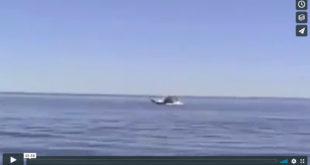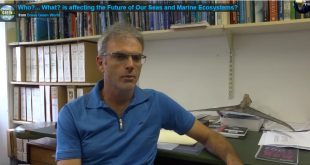In a panel discussion on Avoiding Irreversible Ocean and Polar Thresholds globally, Dr Carol Turley introduces specialist speakers on the subjects of Oceans, Polar Ice, Sea Rise and Oceanic solutions at COP 22, Marrakech.
Mr Philip Duffy (Physicist) and President and Executive Director at Woods Hole Research Centre gives and introduction on events and ideals within the worlds Oceans and Cryosphere.
Oceans play an incredibly important and under appreciated role in Climate Change and the Earth is absorbing more energy from space than it emits back out into space, with the excess energy (over 90%) going into the oceans and only about 1% into the atmosphere. The ocean absorbs roughly 25% of the carbon dioxide emitted by humans globally into the atmosphere and these additions of heat, energy and CO2 into the oceans are having profound consequences, one of which is a “hot spot” of Climate Change, i.e. the Arctic, which is warming at least twice as fast as the rest of the planet. The changes in this region are not just detectable, but actually obvious and although true, it may be more significant that the global consequences of Climate Change in the Arctic are potentially more important and nowhere, with immediacy, is the concept of thresholds and tipping points more important than in the Arctic in terms of GHG emissions from thawing permafrost and commitment to eventual complete melting of the Arctic ice sheet.
Conclusion : In my opinion, its tipping points like these in the Arctic and elsewhere that really should drive the urgency behind addressing global Climate Change generally.
Dr Carol Turley of the Plymouth Marine Laboratory and an Ocean Acidification expert in her field speaks on carbon dioxide in the atmosphere and how it impacts the oceans through Ocean Acidification.
We have crossed the threshold already in terms of carbon dioxide concentrations in the atmosphere, rising year on year, and this year it went above 400 ppm, due to burning of fossil fuels and to a lesser extent deforestation, but only 47% of the emissions remain in the atmosphere, the rest is taken up in equal parts by the biosphere, land plants and the ocean (27%), assisting in the reducing atmospheric warming but causing Ocean Acidification (OA = the change in the pH of the ocean which is a measure of acidity).
Other major changes to the ocean carbon cycle (chemistry), i.e. carbonate ions and bicarbonate ions, which have varied impacts on marine organisms, like corrosion of shell and skeletal materials, CO2 seeping through coral reefs leading to loss of diversity and structural complexity, which at <7.8pH there is no reef development.
It has been proven by a study done on One Tree Island in the Great Barrier Reef, that when an entire reef ecosystem had the chemistry converted back to pre-industrial times, the result was the reversal of Ocean Acidification which enhanced net coral reef calcification, with calcification increasing by 6.9 +/0.9%, proving that Ocean Acidification is already impairing reef growth.
The variability of Ocean Acidification impacts relates to the life cycle of marine organisms in the environment, and in order to understand their vulnerability to this impact, their entire life cycle including physiology need to be studied very closely.
How climate scenarios and impacts translate into the changes in sea surface temperature, which today is at 0.83°C and if we continue with BAS (business as usual), it will be over 3°C higher and with NDC’s (Nationally Determined Contributions) being implemented over next years to 2020, it will reduce to between 2-2.6°C, which is still too high.
To conclude – current NDC’s are not sufficient to avoid high risks of impact to the ocean ecosystems and the goods and services that they provide ~ ‘We need to build on them urgently’ !
Links:
http://whrc.org/ (Woods Hole Research Centre, Massachusetts)
http://www.pml.ac.uk/Research (Plymouth Marine Laboratories, UK)
 Mother Channel Environmental, climate change news and media.
Mother Channel Environmental, climate change news and media.



